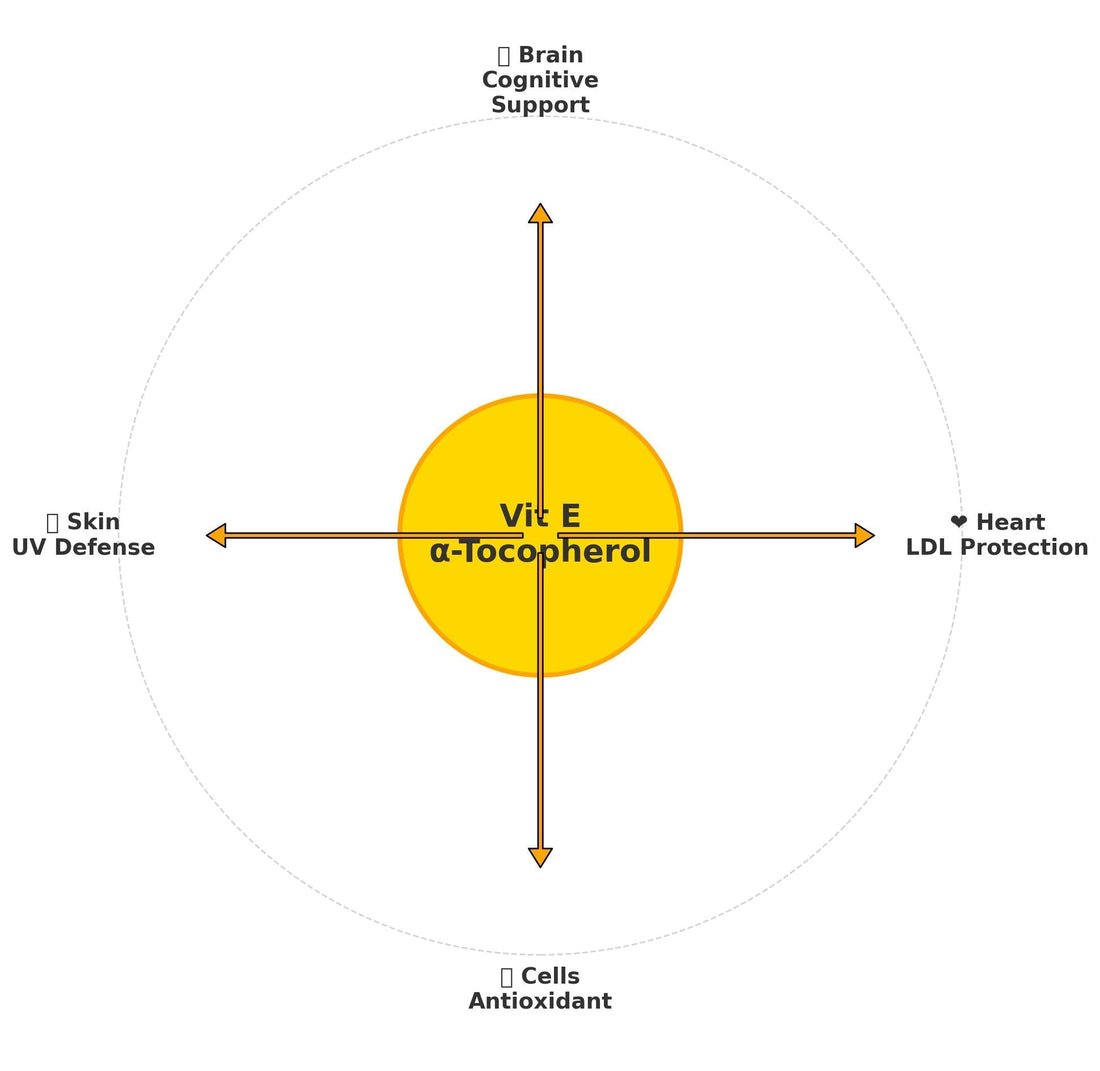
Vitamin E: The Antioxidant Shield for Your Body and Mind
Share
Vitamin E, a powerful fat-soluble antioxidant, plays a vital role in maintaining human health by protecting cells from oxidative damage. According to a review by Traber and Stevens (2011), vitamin E is essential in neutralizing free radicals, which are harmful byproducts of metabolism that can contribute to chronic diseases, aging, and cellular dysfunction.
Antioxidant Power and Cellular Defense
Vitamin E primarily exists as α-tocopherol in the human body and integrates into the lipid bilayers of cell membranes. Its presence prevents lipid peroxidation, thereby preserving the structural integrity of cells (Maret, 2020). The reduction of oxidative stress not only supports cellular health but also contributes to the prevention of diseases such as cancer, cardiovascular disorders, and neurodegenerative conditions (Brigelius-Flohé & Traber, 1999).
Cardiovascular Health
Emerging evidence suggests that vitamin E contributes to cardiovascular health by inhibiting the oxidation of low-density lipoprotein (LDL) cholesterol, a key factor in the development of atherosclerosis (Knekt et al., 2004). The Alpha-Tocopherol, Beta-Carotene Cancer Prevention Study Group (1994) found that adequate intake of vitamin E correlates with a reduced risk of coronary heart disease in certain populations, although results vary depending on lifestyle and genetic factors.
Skin and Immune Benefits
Vitamin E’s antioxidant activity extends to skin protection. It safeguards the skin from ultraviolet-induced photodamage, accelerates wound healing, and enhances skin barrier functions (Keen & Hassan, 2020). Moreover, it has immune-enhancing properties by modulating T-cell function and reducing inflammatory responses (Meydani et al., 1998).
Cognitive and Neurological Support
Vitamin E may also play a role in maintaining cognitive health. A study by Mangialasche et al. (2010) observed that higher plasma levels of vitamin E compounds were associated with a lower risk of Alzheimer’s disease. While supplementation outcomes are mixed, vitamin E’s neuroprotective effects remain a topic of interest in age-related cognitive decline research.
Recommended Intake and Considerations
Despite its benefits, excessive vitamin E intake, especially through supplements, can pose health risks such as hemorrhage or interference with other fat-soluble vitamins (Traber, 2014). The recommended dietary allowance (RDA) for adults is 15 mg/day of α-tocopherol, preferably from dietary sources such as nuts, seeds, vegetable oils, and green leafy vegetables.
Conclusion
Vitamin E serves as an indispensable nutrient for maintaining cellular resilience, heart health, skin integrity, and potentially cognitive function. While the science continues to evolve, ensuring adequate intake through a balanced diet remains a cornerstone of preventive health care.
📚 References:
-
Traber, M. G., & Stevens, J. F. (2011). Vitamins C and E: Beneficial effects from a mechanistic perspective. Free Radical Biology and Medicine, 51(5), 1000-1013.
-
Brigelius-Flohé, R., & Traber, M. G. (1999). Vitamin E: function and metabolism. The FASEB Journal, 13(10), 1145-1155.
-
Maret, W. (2020). The redox biology of the antioxidant function of vitamin E and related essential micronutrients. Biofactors, 46(4), 550-565.
-
Knekt, P., et al. (2004). Antioxidant vitamins and coronary heart disease risk: a meta-analysis. American Journal of Clinical Nutrition, 80(6), 1508-1520.
-
Keen, M. A., & Hassan, I. (2020). Vitamin E in dermatology. Indian Dermatology Online Journal, 11(4), 482.
-
Meydani, S. N., et al. (1998). Vitamin E supplementation and in vivo immune response in healthy elderly subjects: a randomized controlled trial. JAMA, 277(17), 1380-1386.
-
Mangialasche, F., et al. (2010). High plasma levels of vitamin E forms and reduced risk of Alzheimer's disease in advanced age. Journal of Alzheimer's Disease, 20(4), 1029-1037.
